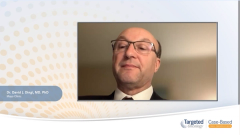
Patient Case: A 76-Year-Old Man with Pentarefractory Multiple Myeloma
David M. Dingli, MD, PhD, a hematologist at Mayo Clinic, as he discusses a challenging case of pentarefractory multiple myeloma in a 76-year-old patient and explores novel treatment options.
Episodes in this series

Transcript:
David M. Dingli, MD, PhD: My name is Dr David Dingli. I’m a hematologist at Mayo Clinic in Rochester, Minnesota. I’ve been in practice for almost 2 decades. And today, we’re going to discuss a patient with relapsed/refractory multiple myeloma. Without further ado, this is the case. A 76-year-old man was diagnosed with multiple myeloma 8 years ago, who presents now with pentarefractory disease that is progressing.
The patient was diagnosed with IgGκ myeloma, as I said, 8 years previously. He has received 4 lines of prior therapy that have included a stem cell transplant, proteasome inhibitors, 2 immunomodulatory drugs, and 1 anti-CD38 monoclonal antibody. As far as comorbidities go, the patient has hypertension, which is well controlled with lisinopril. His performance status is ECOG 1. We had a conversation with the patient, and he asks about the potential for therapy using chimeric antigen receptor [CAR] T cells. But after counseling, and the long waiting times at accessible institutions, they have decided to pursue an alternative therapeutic approach.
I would say that this patient is a fairly typical patient with relapsed multiple myeloma. Patients with myeloma are living longer, and because the disease tends to be controlled for a long time, they have typically a good performance status at the time of relapse, although not always. This disease has behaved as one would more or less expect for standard-risk disease. The patient has been living with the illness for about 8 years. We are not provided details about the risk stratification based on cytogenetics, but my guess would be that this patient had fairly standard-risk disease.
It would be important to restage him at this point with cytogenetic studies to assess for the possibility of acquired high-risk mutations. Before the advent of novel immunotherapies such as [CAR] T cells, for which the patient is not interested, and bispecific antibodies, the prognosis for patients with pentarefractory disease, as [in] this case, would have been rather poor with median survival that would be measured in months.
So there are several challenges when we’re treating patients with relapsed/refractory disease. Many of these patients are [older] because, as we know, the median age at diagnosis of multiple myeloma is 69 to 70 years of age. So a patient such as this…they’ll be in their late 70s. They have been rather heavily treated already, and many patients will have additional comorbidities. An additional consideration with treating relapsed/refractory disease is that often the disease starts to behave a bit more aggressively, with the disease becoming more aggressive, so time becomes of the essence in how we’re going to control the disease.
We want to avoid morbidity related to the illness. We want to avoid bone lesions, bone fractures. We want to avoid renal failure. We want to avoid hypercalcemia. So the treatment can be somewhat challenging. Fortunately, nowadays we have powerful agents that are on the shelf in the form of bispecific antibodies, where the expectation of a good response is actually quite high.
In fact, short of CAR T cells, the bispecific antibodies that are now available have unprecedentedly high response rates. Historically, the patient with relapsed/refractory disease would have a response rate of around 30%. This is what we have observed consistently when new therapies were introduced. With the bispecific antibodies, the response rates can be in the 60% to 70%-plus range. So, a much significantly improved prognosis because the response rates to this type of salvage therapy are much higher.
Transcript is AI-generated and edited for readability.


















